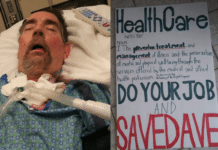
Rationing of medical care is not limited to government programs and health plans. Ten former football players are suing the NFL for failing to recognize their rightful claim to disability benefits.
The players’ affidavit details the NFL’s failure to live up to the organization’s contractual promise to support players with injuries sustained from “investing themselves in the sport.” With an average of 159 concussions per regular season and many additional serious injuries, players depend heavily on the promise of disability benefits.
The NFL has been flagged numerous times over the years for denying coverage for treatment of players’ injuries. A previous lawsuit claimed the inner workings of the NFL disability plan board show “a larger strategy engineered to ensure that former NFL players suffering from the devastating effects of severe head trauma are not awarded Active Football benefits.”
As former Vikings player Brent Boyd stated, the NFL’s insurance policy is “delay, deny, and hope we die.”
Willis McGahee, one of the plaintiffs on the current lawsuit, was routinely denied by doctors when he sought disability benefits to cover the injuries he sustained in 11-years of playing. After four years of appointments, denials, and appeals, McGahee investigated how other players were being treated. He discovered that the doctors he saw had an 87 to 100 percent denial rate.
Former New York Jets player, Eric Smith, found the same result when he looked into the doctor who kept denying his claims. “According to the lawsuit, [Smith] was denied benefits in 2013 by a doctor who was found to have a 100% denial rate in a sample. [Smith] appealed the case in 2014, but the appeal was denied.”
“The complaint suggests the doctors who analyzed the plaintiffs were highly paid by the league, and therefore purposefully minimized the former players’ complaints in reports so the league was justified in denying their applications to avoid payouts,” reports NPR. Conversely, the complaint suggests a doctor receiving a smaller salary was more likely to “accurately detect disabilities.”
Many of the players whose claims have been denied have been granted disability benefits by the Social Security Administration (SSA). However, this does not negate the NFL’s responsibility to former players. The SSA has recognized that the injuries — ranging from concussions to torn ligaments to severe joint pain — keep many retired players from even engaging in a sedentary form of employment. McGahee experiences daily pain — yet the NFL has refused to acknowledge his claims, much less honor its commitment to retired players.
The denials of care being experienced by NFL players is a cautionary tale to all of us. When a doctor is paid by anyone other than the patient, there is an inherent conflict of interest. Today, at least 70 percent of physicians are employees; they are not independent. They are paid to do what the employer wants them to do, or they are paid to do what the government wants them to do, none of which may be in the individual patient’s best interest. These physicians’ decisions are being influenced by third-parties that have no moral, ethical or professional responsibility to the patient. Third-party payers (e.g. Medicare or health plan) may not wish to cover the best care for a patient.
Thankfully, a movement to restore independent practice is underway. The Wedge of Health Freedom (“The WEDGE”) is a free directory of cash-based, independent medical practices and health care facilities across the nation. To avoid conflicts of interests and the rationing of care experienced by McGahee, Smith, and Boyd, Americans can look for a doctor on The WEDGE. A doctor who will value them as a patient in need of care instead of viewing them as a threat to their bottom line.
The views and opinions expressed in this commentary are those of the author and do not represent an official position of Alpha News.
















